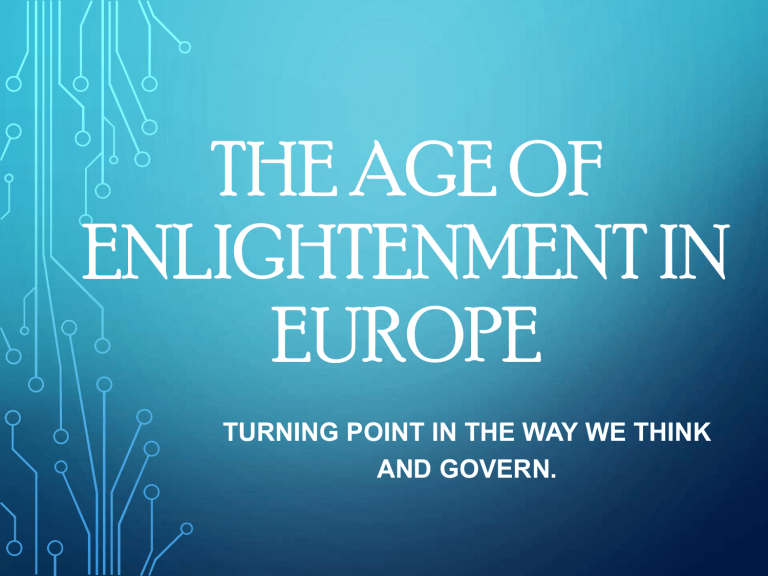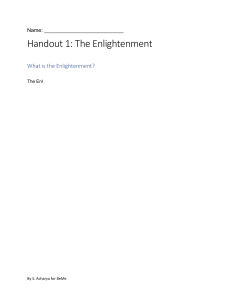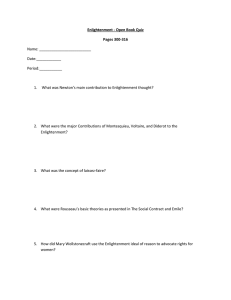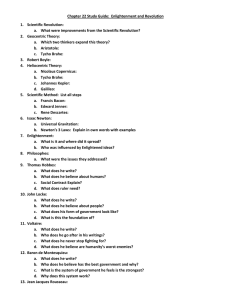
THE AGE OF ENLIGHTENMENT IN EUROPE TURNING POINT IN THE WAY WE THINK AND GOVERN. DO NOW – ISN PREVIEW PAGE This Photo by Unknown Author is licensed under CC BY AGE OF ENLIGHTENMENT / AGE OF REASON “…will become more enlightened day by day so that all previous centuries will not be lost in darkness by comparison.” - Bernard de Fontenelle, 1702 This Photo by Unknown Author is licensed under CC BYSA THE ENLIGHTENMENT • An intellectual movement that stressed reason and logic to answer societal questions in government and life. • • • Began in France and spread throughout Europe. A response to absolute rule. 1700 – 1800s. Introduction Video https://youtu.be/T3At8QiudnQ ESSENTIAL VOCABULARY o Enlightenment: a period during the 1600s and 1700s in which educated Europeans changed their outlook on life by seeing reason as the key to human progress. o Age of Reason: another name for the Enlightenment o Salons: in France, a simple meeting of philosophers to discuss ideas during the Enlightenment o Philosopher: a scholar or thinker o Reason: Using logical thinking, not superstition IMPORTANCE OF SALONS • The concept of salons wildly popular in Paris with bourgeoisie (middle class). • Thinkers (philosophes) meet to in home salons to discuss their ideas privately • The philosophes were French social critics in the mid-1700s. • Some of these philosophes worked to bring civic awareness to the rest of the people. • Paris becomes the center of the Enlightenment during 1700s. • For example, Italian philosopher Cesare Beccaria worked to reform justice system by calling for speedy trials and greater rights for criminal defendants. This Photo by Unknown Author is licensed under CC BY-SA Causes of The Enlightenment Absolute rule of monarchs taking power away from their citizens; leading to the Glorious Revolution. The questioning of previous beliefs in science and religion. Humanist ideas and the belief in “self-rule”. King James II of England This Photo by Unknown Author is licensed under CC BY-SA Galileo Galilei DEVELOPMENTS OF PHILOSOPHY • Enlightenment philosophers combined logic and reason to answer questions about government. • Logic: the process in determining an argument as valid or not. • Example: All humans have heart. Tom is a human. Therefore, Tom has a heart. • Reason: an argument makes common sense, through observation and scientific means. ROOTS OF THE ENLIGHTENMENT • The Enlightenment grew out of the Renaissance, Reformation, and the Scientific Revolution. • What’s the same?: Like all of these other movements, much Enlightenment thinking challenged accepted beliefs. • What’s new?: Enlightenment philosophers wanted to use the ideas and reason of the Scientific Revolution for problems in government and society. WHY NOW?? • France under King Louis XIV: • Centralized the military, economy, religion, and government under his rule. • Believed in Divine Right of Kings • 3rd Estate of French society poor and malnourished. • French economy bankrupt. • Terrible famine of 1780s no response from the king. King Louis XIV of France MORE – WHY NOW? • Glorious Revolution, England • The English Civil War – struggle between the people (represented by • • • • • • Parliament) and the Monarch – began before the signing of the Magna Carta in 1215. King Charles wanted ABSOLUTISM, but the people wanted protection of rights. This dispute led to King Charles disbanding Parliament for 11 years, also known as 11 Years of Tyranny. Oliver Cromwell led campaign against King Charles – led to the king’s beheading. After his death, his unpopular brother continued with abuse of power and restricting the power of Parliament. Different rulers took over for many years, including King James II (wildly unpopular) because he was a devout Catholic and wanted to return England back to being a Catholic run country. King James II lost the throne to his daughter Mary and her husband William of Orange (Dutch Prince) who were invited to take over. Their overthrow did not require bloodshed since they were invited by members of Parliament. At their joint coronation, Parliament presented them with the English Bill of Rights of 1689 – promoted the rights of people. ISAAC NEWTON – UNIVERSAL LAWS OF MOTION, SCIENTIFIC EXPLANATION OF THE WORLD • Develops mathematical ideas that explain the physical universe • Laws of Motion 1. An object in motion will remain in motion 2. Force = mass X acceleration 3. For every action, there is an equal and opposite reaction MORE – WHY NOW? • Scientific Revolution convinced many European thinkers about power of reason. • Scientific method and reason led to discoveries about physical world • Wondered if reason could be used to study human nature, society • • • • New generation of philosophers, 1600s Viewed reason as best way to understand truth Concluded reason could be used to solve all human problems This time of optimism now called the Enlightenment INTO ENLIGHTENMENT • • • Occurred between 1650 -1789 • Thinkers believed reason could be used to uncover the laws that govern human life • • • • Once the laws were known people could make society better • Philosophers wrote the words that inspired revolutionaries, both in America and in France Revolution in philosophy Philosophers, inspired by scientists, started questioning God and God’s role in society Believed that reason was a much better guide than faith or tradition Particular emphasis was placed on criticizing government and the church Paris, France was the hotbed of reason – rather ironically, it was also the center of Absolutism and Divine Right FIVE CENTRAL CONCEPTS AND BELIEFS 1. REASON – The methods of natural science should be used to understand all aspects of life - through the use of • Rejection of superstition and tradition • Tolerance and equalit • Deism - God does not intervene in the world through miracles; he created the world, and then removed himself from it 2. NATURE – Society centered around the natural laws of human society as well as the natural world (“social science”) 3. HAPPINESS – a person who lives by nature’s law finds happiness; argued against medieval notion that people should accept misery as part of life’s circle; Philosophes believed in well-being on earth 4. PROGRESS – The idea of progress remained focused on the confidence in human power, human reason to improve society. 5. LIBERTY – freedoms should not be merely granted, but expected; beliefs that we are born with liberties in nature ENLIGHTENMENT BASICS • Despot: • • a king or other ruler with absolute, unlimited power. The Enlightenment did not change Europe overnight. Many countries still had kings. Some of them became “enlightened despots” by using enlightenment ideas in their countries. Examples: Some kings ended the use of torture, started universities, and used religious tolerance. They wanted to keep the people happy without losing their power. THE SOCIAL CONTRACT • Men form governments. • Governments must respond to the needs of men. • If a government does not respond to the needs of men, men have the right to change the government. • Many of The Enlightenment philosophers believed in a social contract. Rousseau actually penned one of his book on the concept. VIEWS ON THE SOCIAL CONTRACT • Who are the “men”? Who determines whether or not the government is serving the needs of men? • What does it mean to “change” the government? There have been different answers/opinions/views to these questions from throughout history – • Locke • Rousseau • American Founding Fathers • French Revolutionaries • Karl Marx • Southern leaders in the US in 1861 • Vladimir Lenin • Chairman Mao • Today? ENLIGHTENMENT BASICS – CONT’D • Principal targets: Religion and the domination of society by hereditary aristocracy. • • • • • • In other words, the church and the state, who often worked hand-in-hand, during the time. Every social, political and economic problem could be solved through the use of reason Governments are created to secure an orderly society Hint, hint… This is a CALVIN & Separation of powers is the best way to protect human liberties HOBBES cartoon All men are created “free and equal” A free market should be allowed to regulate trade ENLIGHTENMENT - QUESTIONS RAISED • What society worked best? • Why were laws unjust? • How did the universe operate? • Was there a God? • Was the Earth really 4,000 years old? • Were there natural laws that governed people? • Who had the power to rule? • What did it mean to “change” the government? • How did the human mind work? Why do you think the man is naked, out in nature, and also working on geometry with the protractor? THINK – PAIR – SHARE • In what ways are the periods of the Renaissance, Reformation, and Scientific Revolution similar to the Enlightenment? • Pair up with the person seated next to you. • Two groups to share • My response: They are similar because they all challenged accepted beliefs. REVIEW QUESTIONS 1. 2. 3. 4. What is another name for Enlightenment? • Age of Reason Where would people meet to discuss ideas during the Enlightenment? • A salon What is the period during the 1600s and 1700s in which educated Europeans changed their outlook on life by seeing reason as the key to human progress? • The Enlightenment The Enlightenment took the reason of the Scientific Revolution and used it for_________ • Government FIGURES OF THE ENLIGHTENMENT ADD THE FOLLOWING TERMS TO YOUR VOCABULARY LIST FROM YESTERDAY • Social Contract: an agreement between people and their government, in which people give up some things in return for the benefit of having government. • Natural rights: rights that people have simply for being human. • Bill of rights: a list of basic rights a government must protect. • Constitutional Monarchy: a form of government in which the king’s power is limited by a basic set of laws, or Constitution. THOMAS HOBBES – ABSOLUTE RULE BY KINGS • Hobbes’ Governmental Beliefs: • Governments were created to protect people from • their own selfishness. Absolute Monarchy (Leviathan) • WHY?? 1. 2. After the horrors of the English Civil War, Hobbes believed people to be cruel, selfish and wicked. Without a strong government to control the people, chaos would ensue. • In 1651, he published a book called Leviathan. In this book, he wrote that people are driven by a restless desire for power. Hobbes’ Leviathan (Absolute Ruler) THOMAS HOBBES – ABSOLUTE RULE BY KINGS • Thought without laws, people would always be in a state of • • • conflict. In such a “state of nature”, life would be “nasty, brutish, and short.” People agree to a social contract: • People give up individual rights, in exchange for safety and order. • Would end war and death due to strict laws and absolute control. Other Enlightened thinkers did not agree with him, but he was important because he was one of the first thinkers to apply reason to the problem of politics THINK – PAIR - SHARE • Hobbes’ ideas are based on the idea that people are • • naturally selfish. Do you agree with this? Why or why not? What does Hobbes mean when he said that if there was no government, life would be “nasty, brutish, and short.”? Do you agree with this idea? Why? Why not? We will have 2 groups share their discussion. BE PREPARED! JOHN LOCKE: SOCIAL CONTRACT AND NATURAL RIGHTS • Locke’s Governmental Beliefs: • Democracy & Self Rule: • • • • People can be trusted to govern themselves. The only role for government is to protect the people. Favored constitutional monarchy and people’s bill of rights. All people are born free with three natural rights: 1) Life 2) liberty 3) property • Wrote multiple essays and books on v • arious philosophical topics, including Two Treatises on Government. • He believed the purpose of government was to protect people’s natural rights. • If government is not doing it’s job…people have a duty to overthrow them. Locke JOHN LOCKE: SOCIAL CONTRACT AND NATURAL RIGHTS • • • • In exchange protection, people gave government the power to rule on their behalf. We call this idea the “consent of the governed.” Lasting Impact: the idea that government could be overthrown if it failed to respect people’s rights had wide influence and was ultimately echoed in the American Declaration of Independence. Locke was in favor of constitutional monarchies. This meant laws or a constitution limited the power of the monarchs (or kings). In 1689, the English set down a new set of rules called the English Bill of Rights. This strengthened the power of the people and their representatives in Parliament (an English congress.) This Photo by Unknown Author is licensed under CC BY-SA-NC REVIEW QUESTIONS 1. 2. 3. 4. 5. What is it called when the people give up certain powers in return for the benefits of government? a. A social contract What are rights that you have simply for being human? a. Natural rights What did Locke say these natural rights included? a. Life, Liberty, Property When we split the powers of government among three branches, what is this called? a. Separation of Powers If the government becomes corrupt, what does Locke say to do? a. Overthrow the government BARON DE MONTESQUIEU – SEPARATION OF POWERS • He wrote The Spirit of Laws in 1748 – describing how governments should be organized. • His idea: By dividing different powers among more than one branch of government, no one group in the government could grow too powerful. • Each branch of government checked the other branches. When powers were not separated this way, Montesquieu warned, liberty was soon lost. He said: “When the legislative and executive powers are united in the same person…, there can be no liberty.” This Photo by Unknown Author is licensed under CC BY-SA • Lasting Impact: He greatly influenced the men who wrote the U.S. Constitution. We now have a separate legislative (Congress), judicial (courts), and executive (President) branch. BARON DE MONTESQUIEU – SEPARATION OF POWERS • Montesquieu’s Governmental Beliefs: • Democracy and Separation of Powers • Believed England was best government because the king (monarch) and Parliament “checked” each other. • Keeps one individual or group from having too much power • Later called “checks and balances” • Highly influential to the U.S. Constitution. VOLTAIRE – RELIGIOUS TOLERANCE AND FREEDOM OF SPEECH • Voltaire’s Governmental Beliefs: • Democracy and Individual Rights • • • Was an outspoken opponent of King Louis XIV and absolute rule in France. Also spoke out against the power of the Catholic Church. Send to prison 2 times for his beliefs. • Freedom of Speech & Religion • “I do not agree with a word you say, but will defend to the death your right to say it.” VOLTAIRE – RELIGIOUS TOLERANCE AND FREEDOM OF SPEECH • • His most famous novel was Candide, in which he poked fun at old religious ideas. Advocated: • • • Religious tolerance and speech. Tolerance means the acceptance of different beliefs and customs. The right of citizens to a fair and impartial trial Lasting impact – Voltaire met Benjamin Franklin, and when the U.S. Bill of Rights was written, the ideas of freedom of religion and freedom of speech were added to our 1st amendment to the Constitution. This Photo by Unknown Author is licensed under CC BY-SA-NC CESARE BECCARIA • • Pioneered criminology • focused on rights of the accused • fair treatment • Against tortured confessions and secret trials Wrote a book On Crime and Punishment • Beliefs: • Laws existed to keep order, not to punish crimes. • Opponent of torture and capital • • punishment. Argued for speedy trials and punishments that fit the crime. Ideas would influence amendments to the U.S. Constitution. CESARE BECCARIA The Torture Rack • • Pioneered criminology • focused on rights of the accused • fair treatment • Against tortured confessions and secret trials Wrote a book On Crime and Punishment • Beliefs: • Laws existed to keep order, not to punish crimes. • Opponent of torture and capital • • punishment. Argued for speedy trials and punishments that fit the crime. Ideas would influence amendments to the U.S. Constitution. JEAN-JACQUES ROUSSEAU • Rousseau’s Governmental Beliefs: • Democracy & Individual Rights • Rousseau’s “Social Contract” was an agreement between the people. • Citizens must agree to create a free society and government that promoted citizen’s rights. • These ideas would fuel the French Revolution of 1789. ENLIGHTENMENT CAUSE & EFFECT TCHART CAUSE EFFECT Renaissance – Influence of the Classics Focus on Man’s Creativity and challenged the church’s authority Scientific Revolution 1. Belief in sun centered universe scientific method 2. Innovations – like improved telescope/ microscope 3. New science fields – like astronomy/ chemistry 4. New way of thinking about day to day life – like government and rights Social and Economic Changes – heavily influenced by Colonization and Exploration – higher taxes 1. 2. Middle class making large impact on world – now wants recognition Monarchs spending a large amount of “new money” Political (despotism) and religious persecution Natural Rights ideals and Bills of Rights Censorship until the printing press allowed mass communication, spreading ideas of inequality 1. Enlightened despots (tyrants) 2. Three branches of government 3. All revolutions (American, French, Latin, Russian) IMPACT OF THE ENLIGHTENMENT • Enlightenment thinkers and ideas changed the world forever: • Questioned previous beliefs • • such as geo-centrism, absolutism, and unequal social classes. Inspired ideas in science, government, and individualism. Will lead to societal revolutions in America, France, and Latin America. WOMEN OF THE ENLIGHTENMENT MADAME GEOFFRIN • One of the leading sponsor of salons • Diversity of thinkers in her home – princes, politicians, artists, writers and philosophers • Financial support to the Encyclopedists OLYMPE DE GOUGES • Different from others – butcher’s daughter with little education • Published the Declaration of the Rights of Woman and the Female Citizen (1791) in response to the National Assembly’s declaration. • Beliefs on women’s rights: • • • • • Right to vote Hold office Own property Serve in the military Equal power to men at home and in church WOMEN OF THE ENLIGHTENMENT • • • This Photo by Unknown Author is licensed under CC BY-SA ABIGAIL ADAMS Wife to John Adams, who was a leader of the American Revolution and later President. She reminded her husband not to forget women in the Revolution. “Remember, all men would be tyrants if they could. If particular care and attention is not paid to the Ladies, we are determined to start a rebellion…we will not hold ourselves bound to any Laws in which we have no voice.” MARY WOLLSTONECRAFT • Beliefs: • Argued for women’s rights in education and jobs. • Influenced women’s rights movements around the world. • 1792 essay Vindication of the Rights of Women stating men and women deserved the same rights. • “If absolute monarchy be not necessary in a state, how comes it to be so in a family?...If all men are born free, how is it that all women are born slaves?” l Age of Reason (18th century Enlightenment) Natural laws apply to government as well as science! l Rights to Life, Liberty, and Property l A FAIR society is based on REASON, not “Divine Right” l



